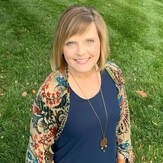|
This has been one of the most beautiful falls we’ve had in several years—and we’ve certainly needed it, haven’t we? The leaves have been spectacular, displaying their vivid colors against the bright blue autumn sky. One reason it has been especially beautiful to me is that the red-leafed maple trees have seemed more prevalent this year, accenting the mix of yellow- and orange-leafed trees that are more common here in Middle Tennessee. Perhaps there aren’t actually more maple trees than last year, but it’s just their year to show off. And they’re certainly doing a good job of that! In any case, I have truly enjoyed the diversity of colors. Diversity makes the world more interesting and beautiful. That’s the appeal of travel—visiting places where the scenery is unique, filling us with awe and wonder in our amazing God. We were made to appreciate, even long for, the creativity and beauty of our diverse world. Here’s a question I’ve been pondering this fall as I’ve enjoyed the colorful trees in the midst of so much discord all around us: Why do we so easily embrace the diversity we see in the natural world yet often struggle to embrace the diversity we see in other people? This year, with all that has been going on in our nation and our world, “difference” has seemed to cause more distrust than appreciation, more division than celebration. And it has taken its toll on us—even among family members and friends. All of the arguing and name calling we’ve witnessed—and perhaps participated in at times—has caused many to draw sharp dividing lines, relegating people to camps or “boxes.” Yet the truth is that despite our differences and disagreements, we all are beautiful creations of our amazing God. Regardless of our views on COVID or masks or the election or race relations or any other issue we could name, we all are dearly loved by the creative God who made us. Despite our differences and disagreements, we all are beautiful creations of our amazing God. God doesn’t love us “if”—if we look or think or act a certain way. God simply loves us. We do nothing to earn God’s love. It is freely extended to us without condition. That is why God’s Son came to earth, so that we could know the extent of God’s love—"how wide, how long, how high, and how deep" it is (Ephesians 3:18 NLT). It is a love that rescues, liberates, and transforms—and it is meant for all. God’s unconditional love doesn’t excuse or overlook hurtful behavior, and there are consequences to our actions; but God never gives up on us. And that’s good news! Regardless of our differences, we have this in common: God never stops pursuing us and inviting us to be transformed and healed by God's love so that we can love each other with that same astonishing love. Soon we will be gathering around our tables to give thanks. Though our numbers may be smaller this year and some of us may be joining loved ones via Zoom or FaceTime, we still will have the opportunity to bear witness to the beautiful diversity and creativity of God on display within our very own families and friends. So, here’s my Thanksgiving proposition. As we cook and eat and talk together, let’s redeem 2020 by making space for one another to be seen, known, and loved. Let’s allow each other to be who we are, extending an invitation to freely share our hurts and hopes with one another (if it feels safe to do so). Let’s listen to each other’s thoughts and viewpoints—truly listen—without judgment or ridicule, remembering that our differences do not have to separate us but actually can be like good seasoning, adding variety and spice to our lives. Just think how bland Thanksgiving dinner would be without sage, thyme, rosemary, or pumpkin spice! In the same way, our lives would be dull and boring without the differences of others—even the ones we may find irritating at times. Our differences do not have to separate us but actually can be like good seasoning, adding variety and spice to our lives. That child or teenager who is pushing our buttons? What if we took a breath and remembered that we were their age once too, giving them room to grow and discover who they are? That spouse or roommate who is getting under our skin because we’ve been cooped up together for nine months? Just think how much we would miss them—and their idiosyncrasies—if they weren’t a part of our lives anymore. That relative or friend who has different political or religious views and can be opinionated? Perhaps it will help to remember that “us” versus “them” constructs are rooted in fear (the fear of what we don’t know, don’t understand, or can’t control), and reacting defensively only closes us off, creating more barriers. But listening without defensiveness opens us to understanding, empathy, and connection (none of which, by the way, requires agreement or assent). Here's an important caveat. If you have been abused (whether verbally or physically), deeply hurt, or repeatedly disrespected by someone, setting boundaries is necessary and important for your own well-being. Depending on the situation, that might mean not having contact for a period of time or even deciding that it’s not healthy for that person to be a part of your life. (Meeting with a counselor, pastor, or spiritual director can be helpful as you discern appropriate boundaries.) If you do spend time with an unsafe person who begins to speak or act disrespectfully or cause harm in any way, it’s always appropriate to set a boundary. Sometimes loving others with the love of Christ means saying, “It’s not OK for you to speak to me/treat me that way” and removing yourself from the situation or asking the other person to leave. Embracing differences does not mean allowing others to do harm to yourself or others. Embracing differences does not mean allowing others to do harm to yourself or others. My prayer for all of us this Thanksgiving, whether we gather in person or connect virtually with loved ones, is that we will keep our focus on the people we love, not the things that threaten to divide us. Let’s be thankful for the unique individuals God has made us to be and look for the things we can affirm in each other—even if it’s only that we recognize the other person’s individuality and passion. Then, as we begin to embrace the diversity of the people in our homes or on our screens, let’s invite God to continue healing and stretching our hearts so that we can appreciate and embrace even more people who are different from us. Whether they live across the street, across town, across the country, or across the globe, may we ask God to enable us to love them with the astonishing, inclusive love of Christ. 16 And I pray that [God] would unveil within you the unlimited riches of his glory and favor until supernatural strength floods your innermost being with his divine might and explosive power.
17 Then, by constantly using your faith, the life of Christ will be released deep inside you, and the resting place of his love will become the very source and root of your life. 18–19 Then you will be empowered to discover what every holy one experiences—the great magnitude of the astonishing love of Christ in all its dimensions. How deeply intimate and far-reaching is his love! How enduring and inclusive it is! Endless love beyond measurement that transcends our understanding—this extravagant love pours into you until you are filled to overflowing with the fullness of God! (Ephesians 3:16-19 The Passion Translation)
0 Comments
Your comment will be posted after it is approved.
Leave a Reply. |
Hi, I'm Sally!
I'm passionate about connecting with God and connecting with people, offering spiritual encouragement and companionship. I'm so grateful to be on the journey with you as we walk with God together. subscribeArchives
July 2024
Categories
All
|
|
Copyright 2019 Sally Sharpe Spiritual Direction |
Proudly powered by Weebly
|


 RSS Feed
RSS Feed
